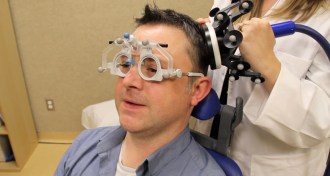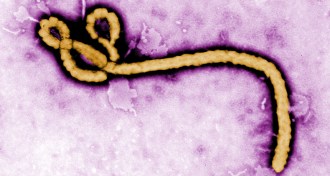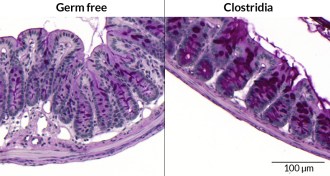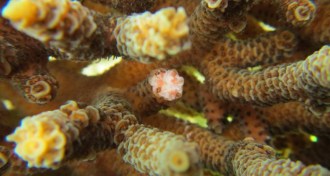News in Brief
-
 Life
LifeZMapp drug fully protects monkeys against Ebola virus
In a test, 18 monkeys injected with the Ebola virus and treated with an experimental drug called ZMapp survived.
By Nathan Seppa -
 Neuroscience
NeurosciencePulses to the brain bring memory gains
The ability to associate faces with words is boosted when an outer part of the brain is stimulated, a study shows.
-
 Health & Medicine
Health & MedicineHuman tests of experimental Ebola vaccine set to start
NIH and NIAID have announced that human tests of an experimental vaccine against Ebola virus will begin in early September.
By Nathan Seppa -
 Life
LifeGut bacteria may prevent food allergies
In mice, gut bacteria blocked food from seeping out of the intestines and triggering an immune reaction in the bloodstream.
By Meghan Rosen -
 Animals
AnimalsCorals, fish know bad reefs by their whiff
Compounds drifting off certain overgrown seaweeds discourage young corals and fish from settling in failing reefs.
By Susan Milius -
 Anthropology
AnthropologyRichard III ate like a king before biting the dust
King Richard III’s brief reign included a sudden shift to eating fancy food and drink.
By Bruce Bower -
 Materials Science
Materials ScienceMagnets get flipped by light
Controlling magnetism with lasers could lead to faster computer hard drives.
By Andrew Grant -
 Animals
AnimalsHummingbirds evolved a strange taste for sugar
While other birds seem to lack the ability to taste sugar, hummingbirds detect sweetness using a repurposed sensor that normally responds to savory flavors.
-
 Animals
AnimalsOlinguito’s bio built by crowd-sourcing
Crowd-sourcing fleshes out the bio of little-known raccoon relative, the olinguito.
By Susan Milius -
 Health & Medicine
Health & MedicineElderly benefit from high-dose flu shot
High-dose vaccine may offer people age 65 and older improved protection against the flu.
By Nathan Seppa -
 Neuroscience
NeuroscienceProsthesis uses swinging arms to tell legs when to step
Device creates artificial neural connection that could help paralyzed people walk.
-
 Oceans
OceansMercury at ocean surface may have tripled since preindustrial times
Questions remain over dangers of toxic metal in environment.
By Beth Mole